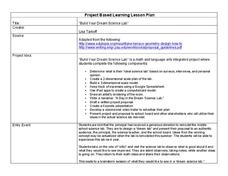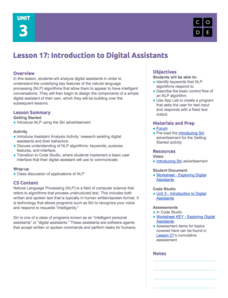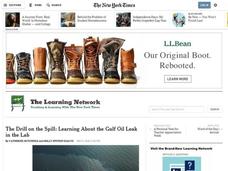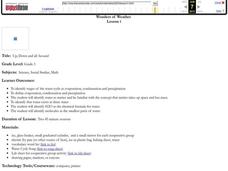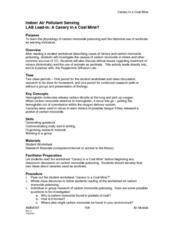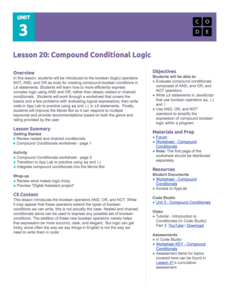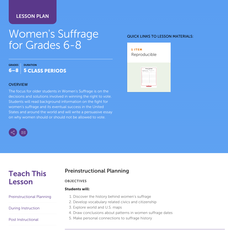Curated OER
Build Your Dream Science Lab
Would your ideal science lab be filled with bubbling beakers and zapping Tesla coils? Or would it contain state-of-the-art computer technology and data analysis? Dream big with an innovative lesson that connects math and language...
Towson University
Mystery Disease
How did scientists determine the cause of illness before technology? Science scholars play the role of medical researcher in an engaging guided inquiry activity. Using observations, technical reading, and Punnett squares, learners...
PBS
NOVA Cybersecurity Lab Lesson Plan
Don't be fooled by cyber scams! An informative lesson teaches techies about cybersecurity. They watch videos, play a game, and engage in discussion to improve their understanding of online safety.
Microsoft
Microsoft Computer Applications
From creating and editing workbooks in Microsoft Excel to designing presentations using Microsoft PowerPoint and documents in Microsoft Word, this is your one-stop, must-have resource for lessons on Microsoft Office (2010).
Code.org
Introduction to Arrays
How can you store lists in a computer program? The 16th installment of a 21-part unit introduces arrays as a way to store lists within a variable. Individuals program a list of their favorite things—adding interest to the activity.
Code.org
Introduction to Digital Assistant Project
How does a computer recognize voice commands? Scholars learn about digital assistants and natural language processing (NLP) algorithms in the ninth lesson plan of the series. They begin building a simple digital assistant and work on...
Code.org
Events Unplugged
Introduce event-driven programming. Young computer scientists learn the meaning of event-driven programming and how it is different from previous styles of programming. They play a card game to simulate the challenges that occur in this...
Curated OER
Project Based Technology in Second Grade
The many activities in this resource serve to introduce second graders to the Macintosh computer and to various programs and their creative product options. They make sideshows using KidPix, practice using email with the Journey South...
Curated OER
The Drill on the Spill: Learning About the Gulf Oil Leak in the Lab
Students research the Gulf of Mexico oil spill and complete experiments to study the effects of oil spills. For this oil spill lesson, students read the NY Times feature on the gulf oil spill. Students visit various links to research the...
Curated OER
Examining a Microchip
In this computer technology lesson learners investigate silicon microchips. Students explore microchip technology using a microscope. Lesson contains hands on investigations.
Columbus City Schools
The Mystery of Earth’s History
Every living creature can leave a fossil record, yet most fossils belong to extinct organisms rather than ones currently living. Scholars learn about dating rock layers, fossils, and the environment of the past. Pupils understand that...
Curated OER
Wonders of Weather
Fourth graders complete activities to study weather and the water cycle. In this water cycle activity, 4th graders observe a demonstration of the three stages of water. Students work in groups to complete a water cycle lab activity....
Curated OER
Particulate Observation Lab
Students collect samples of common dust from their homes and school for examination under a microscope. They identify the components of their samples using the provided "Atlas of Indoor Dust Particles." Pupils take samples form a variety...
Curated OER
Indoor Air Pollutant Sensing LAB Lead-In: A Canary in a Coal Mine?
Young scholars investigate the causes of carbon monoxide in mines and other common sources of CO. Pupils read the worksheet "Canary in a Coal Mine" before beginning this investigation. They discuss ethical issues regarding treatment of...
Code.org
Compound Conditional Logic
Scholars explore compound conditional logic and learn to use the Boolean operators AND, OR, and NOT within conditional statements by incorporating these operators to improve a previously created app.
Code.org
Processing Arrays
Scholars use a playing card activity to help them develop a program to find the minimum value of a list. They learn to use for loops to write code that will process lists.
Code.org
Identifying People with Data
How much information about you is out there? Scholars explore this question as they investigate data breaches and how these violations occur. They then take part in an activity where they research how easily people could get access to...
Code.org
While Loops
Bring your pupils in the loop with while loops. Scholars learn how to modify conditional statements to produce while loops in the 14th activity of the series. They use flowcharts to understand loops and then program some examples of...
Curated OER
Galaxies
Tenth graders explore the structure and content of galaxies. Through discussion, lab, and hands-on activities, they discover the general structure of the three types of galaxies as well as the effect they have on the structure and...
Curated OER
The Virtual Electron Microscope
Students explore the world of the very small using a Flash plug-in Virtual Electron Microscope. They complete and discuss an activity in which unknown samples are placed under the computer simulated microscope to determine where the...
Workforce Solutions
Reality Check
Scholars complete the Reality Chech handout that identifies their potential salary given a specific profession. Pupils examine the lifestyle options and choose what they wish to have; however, each item costs money and, depending on how...
Scholastic
Women's Suffrage for Grades 6–8
Learners study the decisions and solutions involved in winning the right to vote. After reading background information on the fight for women's suffrage, including one woman's story, and its eventual success in the United States and...
PBS
Production
Class members investigate the different roles associated with video production. Then, they create a crash course booklet that details what they have learned about the different roles: video production, scouting locations and set up,...
Chicago Botanic Garden
Climate Change Around the World
You know climate change is happening when you see a bee take off its yellow jacket. Part four in a series of five lessons explores all factors affecting climate change: temperature, cloud cover, precipitation, and carbon dioxide. By...
